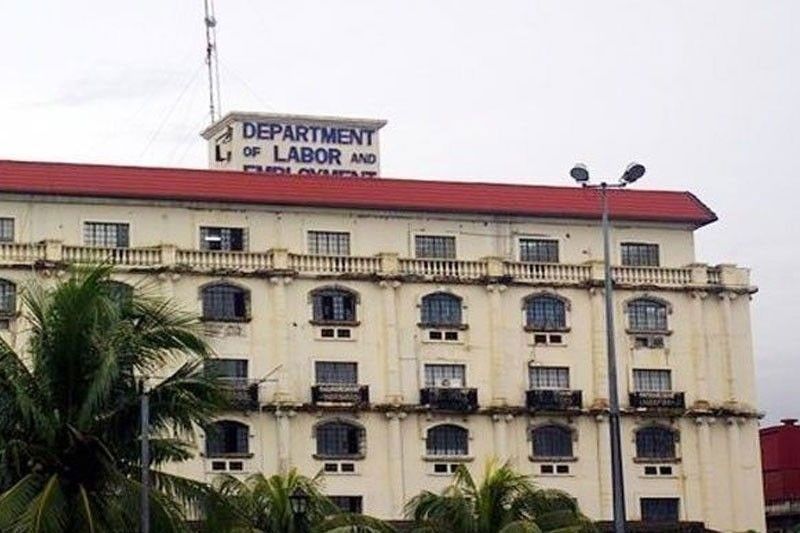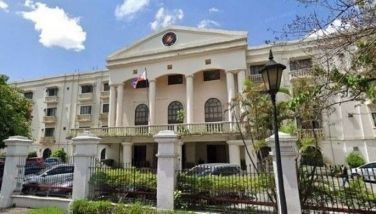DOLE cash aid dwindling as displaced workers hit 1 million

MANILA, Philippines — The assistance fund of the Department of Labor and Employment (DOLE) is nearing depletion as the number of displaced workers due to the coronavirus disease 2019 (COVID-19) pandemic has exceeded a million.
Labor Secretary Silvestre Bello III said yesterday reports coming from the various DOLE regional offices showed a total of 1,048,649 workers in the formal sector affected either by temporary closures of establishments or adoption of flexible work arrangements.
“The figure is on top of the close to quarter of a million informal sector workers needing assistance under the Tulong Panghanapbuhay sa Displaced/Disadvantaged Workers Program - Barangay Ko, Bahay ko (TUPAD-BKBK) program,” Bello said in a statement.
Labor Assistant Secretary Dominique Tutay said the DOLE had already distributed some P900 million financial assistance to about 180,000 displaced workers nationwide.
“(But) with only P1.61 billion available funds under the program, the labor department will reach only about 322,000 workers with the assistance,” Tutay disclosed.
Bello said 98 percent of nearly 42,000 affected establishments are seeking P5,000 one-time assistance from the DOLE under its social amelioration scheme dubbed the COVID Adjustment Measures Program (CAMP).
Aside from CAMP, the DOLE also provides emergency employment assistance under the TUPAD-BKBK program to informal workers.
DOLE - Bureau of Workers with Special Concern (BWSC) director Karen Trayvilla said the TUPAD-BKBK program has so far extended assistance to some 138,000 informal sector workers and processed a total of 235,949 beneficiaries.
Bello said Metro Manila accounted for the biggest number of displaced workers with 246,810, followed by Central Luzon with 179,875 and Calabarzon with 99,178.
Davao region recorded 90,414 displaced workers while Cagayan Valley posted 75,189 and Central Visayas has 51,150. The Cordillera Administrative Region (CAR) reported a total of 46,614 while Northern Mindanao recorded 46,351 and Bicol has 41,322.
A total of 36,526 workers from Western Visayas were also affected and 30,721 workers from Mimaropa.
The least affected regions are Caraga with 26,981; Eastern Visayas, 24,940; Zamboanga peninsula, 24,664; Ilocos, 17,378 and Soccskargen, 11,536.
The DOLE showed that most or 719,649 of the displaced workers were affected by the temporary closure of 31,612 establishments, while 10,224 enterprises employing 366,404 workers resorted to flexible work arrangements.
A majority of affected workers belong to manufacturing, tourism-related sectors and education.
As the number of displaced workers continues to rise, Bello urged the business sector anew to pay their workers and employees even if they are unable to work for the duration of the extended enhanced community quarantine. The extension lasts until April 30.
“I once again knock on the kind hearts of our employers, especially the conglomerates and big businesses. Please extend further your generosity to your employees and workers. Your good-heartedness and compassion (are) a great help to the government,” Bello said.
Go pushes support for MSMEs
Sen. Bong Go renewed his appeal for government support for the middle class, and the micro, small and medium enterprises (MSMEs) affected by the COVID-19 pandemic.
Most MSMEs were forced to temporarily, partially or totally close down due to the extended enhanced community quarantine measures amid the global health crisis, according to Go.
“A huge part of our economy is sustained by MSMEs. Let’s help them revive their businesses and support their employees while the country is in a crisis,” he said.
The senator added that he has seen MSMEs struggle in keeping their businesses operational considering the adverse socio-economic impact of COVID-19.
Data collected in 2018 by the Department of Trade and Industry showed that over 998,342 of the 1,003,111 businesses in the Philippines are MSMEs, making up 99.52 percent of the total enterprises operating in the country.
Go, who also sits as member of the joint congressional oversight committee overseeing the implementation of the Bayanihan to Heal as One Act, lauded the efforts of some MSMEs that have adopted online business transactions in order to ensure availability of basic necessities, such as food in the market and, at the same time, keep their businesses afloat to take care of their employees.
“Many businesses are now run by skeletal workforces and implement the correct social distancing measures to continue to provide service,” he said.
Based on Go’s discussions with Finance Secretary Carlos Dominguez III, the latter said the government is now preparing a subsidy program to provide assistance to MSMEs and their employees, which is set to be rolled out in the coming weeks.
This program will provide subsidies for about four million MSME employees. – With Paolo Romero, Delon Porcalla
- Latest
- Trending




























